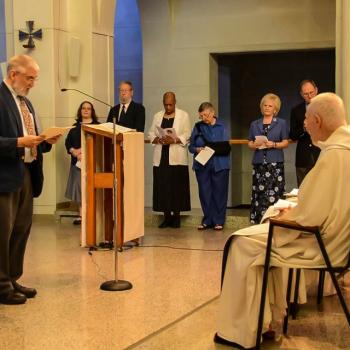 Silent prayer — contemplative prayer, what the Catholic Catechism calls “wordless prayer in which mind and heart focus on God’s greatness and goodness in affective, loving adoration” — is an important element of a mature Christian spirituality. The Bible instructs us to “be still and know… God” (Psalm 46:10), and even promises us that “silence is praise” (Psalm 65:1, translated literally).
Silent prayer — contemplative prayer, what the Catholic Catechism calls “wordless prayer in which mind and heart focus on God’s greatness and goodness in affective, loving adoration” — is an important element of a mature Christian spirituality. The Bible instructs us to “be still and know… God” (Psalm 46:10), and even promises us that “silence is praise” (Psalm 65:1, translated literally).
I thought it might be helpful to reflect on the many ways that contemplation brings blessing into our lives. I’m a little hesitant about this, because I don’t think silent prayer is meant to be goal-oriented; it is not a means to an end. In a very real way, contemplation is its own reward, and the only reason to enter into prayerful silence is for the felicity of offering ourselves and our time to God, without any “benefit” or “advantage” coming from it.
Nevertheless, in just a few minutes of reflection I came up with seven real graces that flow from a regular discipline of contemplative silence. So here is my life — but please read this with the understanding that there is only one real purpose of contemplation: to give ourselves to God. Everything else is merely a happy blessing — not a consequence, not a result — simply a grace that accompanies our response to God’s loving silence.
- Contemplation brings us into the mystery of God. The Bible acknowledges that God is a “hidden” God (Isaiah 45:15) — in other words, to the finite limitations of human mind, God seems shrouded in mystery. We can no more wrap our minds around the Holy One than an amoeba can comprehend a human. But where our logic and rationality ultimately fail us, our heart — our capacity to love and be loved — stands ready to encounter the Divine source of all Love. When we offer our prayer to God in wordless silence, we create the space within us for our heart to take the lead in prayer, receiving grace and offering adoration at a level too deep for words. We may not “understand” silence, but in our heart of hearts, we can know the God who comes to us in mystery.
- Silence teaches us to trust. It is human nature to want to be in control, in charge, on top of things. That’s certainly appropriate on a purely earthly level — but God is not subject to our management or direction. Yet how often, when we pray, do we in fact subtly try to bend God’s will to our own, rather than radically surrendering our will to God? The beauty of contemplation is that, by dispensing with words, we move into a place where we simply have no means to attempt to control God or shape our prayer to what we think is our best advantage. Stripped of all artifice of self-directed mastery, silence in prayer offers us only one option: to trust the God who loves us, hidden in the silence. We trust what we cannot see, may not feel, and certainly cannot manipulate. It’s hard, but it’s spiritually nurturing to do so.
- Contemplation allows us to pray when we have no words to pray. Christianity is a talkative religion, from the Bible to our endless lineage of hymns, sermons, liturgies, and inspirational books. But sometimes even the most eloquent person can’t find the words to express what’s going on in our hearts. Silent prayer releases us from the necessity to be “on ” all the time, to find just the right Psalm or devotional to recite, or (harder still) to be able to put into our own words what’s going on in the hidden places deep within our soul. With contemplation, we offer God our attention, our presence, our very self – without having to wrap it up in a lot of commentary. We simply rest in God’s presence, and that becomes the heart of our prayer.
- Silence helps us to imitate Christ. One of the loveliest passages in the New Testament recounts how Christ, “though he was in the form of God, did not regard equality with God something to be grasped. Rather, he emptied himself, taking the form of a slave, coming in human likeness…” (Philippians 2:6-7) — the Greek word for emptiness used here, kenosis, has become emblematic of Christ’s humble compassion in embracing humanity in the incarnation. How can we, who are already human, follow his example? In contemplation, we divest ourselves of our chattering minds, embracing silence as a kind of “emptiness” in which we make ourselves available for God. So in wordless prayer, we offer to God our desire to follow Christ in all ways — even in humility and emptiness.
- Contemplation undermines the idols of our culture. Dare I say it? Contemplation is countercultural — even (gasp) “subversive.” Our society idolizes the left hemisphere of the brain — linear logic, a way of thinking that judges everything in binary ways: this is good, that is bad; this is right, that is wrong; this is acceptable, that is forbidden. Such dualistic ways of thinking and judging influence the way we do business, politics, science, and even art and religion. Logic has its place, of course, but for society to be whole and complete, the stern judgment of abstract reason must be balanced by the holistic compassion of the heart. In silence, the heart communicates its way of knowing, and thereby prevents the black/white dualism of the mind from dominating our lives — and our faith.
- Silence is good for us, body, mind and soul. The mindfulness movement has offered a secular approach to this particular blessing. My first Christian meditation teacher used to say “meditation is something that is good for our body, our mind, and our soul.” Because in a faith context contemplation is prayer, naturally it nourishes the soul; because it invites us into a place of trust and nondual awareness (see #2 and #5 above), silence is good for our mind, and because it encourages deep relaxation and gentle awareness of our bodies, it is good for us physically as well. Indeed, this “prayer of the heart” is perhaps the most fully embodied way of praying within Christianity: a prayer where we offer our entire self to God — body as well as mind and soul.
- Contemplation fosters community. We often think of this prayer in solitary terms — “when you pray, go to your inner room, close the door, and pray to your Father in secret” (Matthew 6:6). But in many contexts, from Christian monasteries down to the centering prayer groups our out time, we see that contemplative or silent forms of prayer thrive especially well in communal settings. This is because there is something profoundly intimate and bonding when we pray silently together. Just as Eucharistic worship and the Daily Office help to form community, praying together in wordless silence also helps to foster a sense of belonging to the Body of Christ. And this works both ways: when communities pray in silence together, it helps the individuals to have a stronger commitment to contemplation.
 As I said above, I drew up this list fairly quickly, and so I imagine there are other blessings that could be added to this list. Can you think of ways that silent prayer has blessed you? Please leave your thoughts as a comment here on this blog, or in social media. Thank you, and may your daily practice of silent prayer thrive in the light of God’s loving grace.
As I said above, I drew up this list fairly quickly, and so I imagine there are other blessings that could be added to this list. Can you think of ways that silent prayer has blessed you? Please leave your thoughts as a comment here on this blog, or in social media. Thank you, and may your daily practice of silent prayer thrive in the light of God’s loving grace.
Enjoy reading this blog?
Click here to become a patron.














